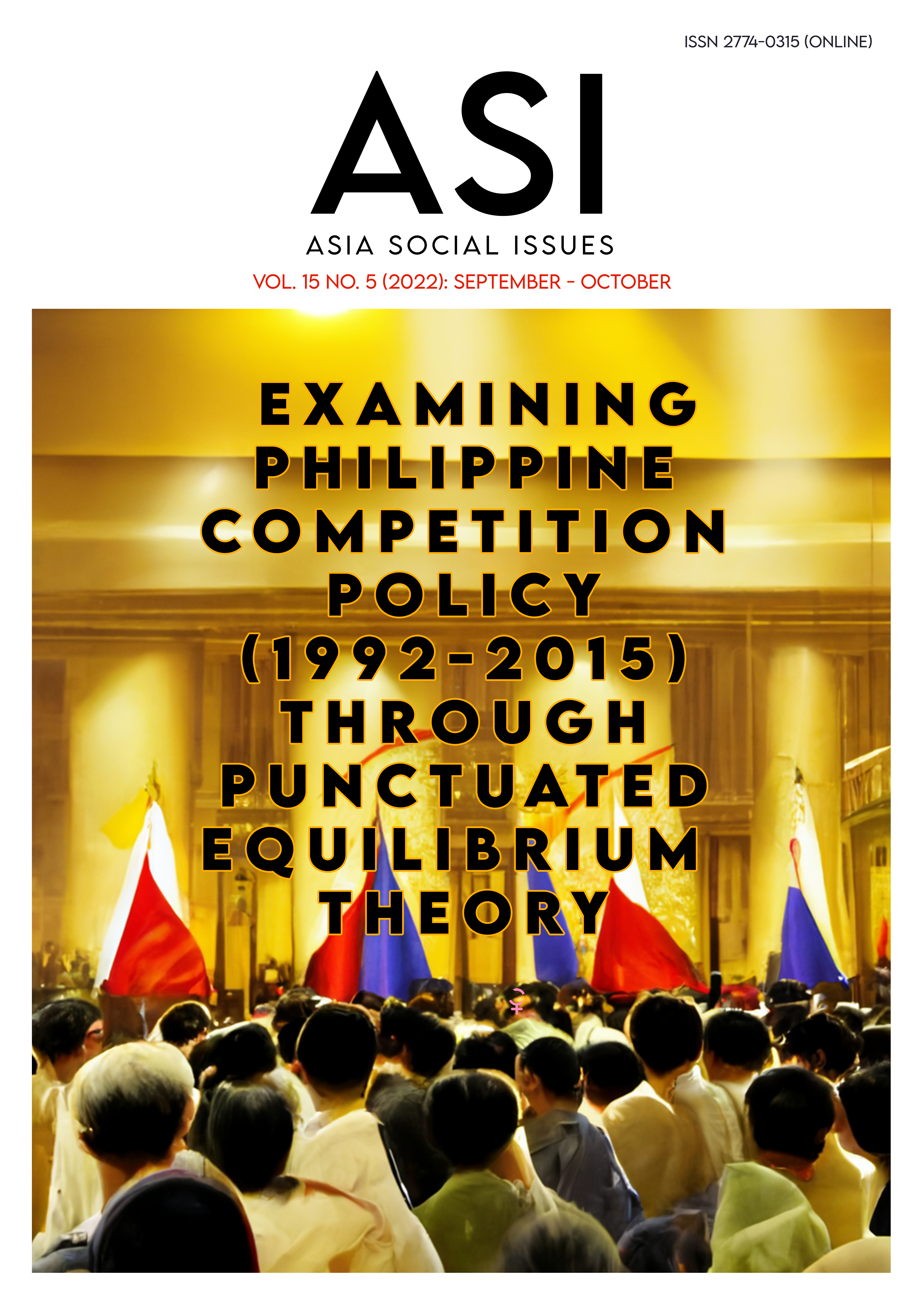Examining Philippine Competition Policy (1992-2015) through Punctuated Equilibrium Theory
Main Article Content
Abstract
For many democracies, competition in the free market is an essential pillar to ensure the continuous improvement of the standard of living of their citizens. In the Philippines, an anti-trust law was only institutionalized in July 2015 after former President Benigno Aquino III signed into law the Philippine Competition Act (PCA). Despite this major legislative landmark, critics argue that it should have been passed two decades ago. The study finds that the role of political institutions has been instrumental in effecting policy stasis as oligarchs and economic elites maintain close links with the legislators and government officials. Furthermore, the Philippine government has opted to focus on issue-neutral, non-controversial, and public works-centered projects to prevent debate among colleagues and to satisfy demands of constituencies. Interestingly, there was no triggering event to effect policy change. Instead, the passage of the PCA is due to two major reasons: domestic rationale; and global developments.
Article Details

This work is licensed under a Creative Commons Attribution-NonCommercial-NoDerivatives 4.0 International License.
Copyright: CC BY-NC-ND 4.0
References
Aldaba, R. (2001). Competition policy: Why does it matter? PIDS economic issue of the day. 2(2), 1-2.
Aldaba, R. (2008). Emerging Issues in Promoting Competition Policy in the APEC and ASEAN Countries. PIDS Discussion Paper Series No. 2008-02, 1-20.
Batalla, E. (2016). Divided politics and economic growth in the Philippines. Journal of Current Southeast Asian Affairs, 35(3), 161-186.
Baumgartner, F. & Jones, B. (1993). Agendas and instability in American politics. Chicago, USA: University of Chicago Press.
Cabalu, H., Kenyon, P., Koshy, P., & Wills-Johnson, N. (2006). Governance structures for competition policy: A case study for the Philippines. The Philippine Review of Economics, 43(2), 101-114.
Cairney, P. (2011). Understanding public policy: Theories and issues. Basingstoke, England: Palgrave Macmillan.
CIA World Factbook. (2022). Philippines. Retrieved from https://www.cia.gov/the-world-factbook/countries/philippines/
Ditucalan, A. (2019). The Philippine competition act: A mestiza? KLRI Journal of Law and Legislation, 9(2), 111-155.
Downs, A. (1972). Up and down with ecology: The “Issue-Attention Cycle”. The Public Interest, 28, 38-50.
Hutchcroft, P. & Rocamora, J. (2003). Strong demands and weak institutions: Addressing the democratic deficit in the Philippines. Journal of East Asian Studies, 3(1), 259-92.
Jones, B. & Baumgartner, F. (2005). The politics of attention. Chicago, USA: University of Chicago Press.
Katigbak, J. (2016). An Inclusive growth agenda for the Philippines. CIRSS Commentaries, 3(6), 1-2. http://www.fsi.gov.ph/an-inclusive-growth-agenda-for-the-philippines/
Liden, J. (1998). In Philippine run for president, estrada relies heavily on advisers. Retrieved from https://www.wsj.com/articles/SB893878647679796500
Magcamit, M. (2016). The enduring curse of patronage politics: Why Filipinos should not elect a patrimonial president. Retrieved from http://halalan.up.edu.ph/viewpoints/by-alumni/281-the-enduring-curse-of-patronage-politics-why-filipinos-should-not-elect-a-patrimonial-president-in-the-2016-elections
Manacsa, R. & Tan, A. (2012). Strong republic sidetracked: Oligarch dynamics, democratization, and economic development in the Philippines. Korea Observer, 43(1), 47-87.
Medalla, E. M. (2000). Issues in competition policy and elements of a rational competition policy for the Philippines: An overview paper. Retrieved from https://pascn.pids.gov.ph/files/Discussions%20Papers/2000/pascndp0008.pdf
Panao, A. (2016). What kinds of laws do our Congress legislate? Retrieved from https://halalan.up.edu.ph/viewpoints/by-experts/222-what-kinds-of-laws-do-our-congress-legislate?fbclid=IwAR1GfG4pZnzij3mtqq_e4Q2tta22AY0dH_Qne3QV7-9FE5BxMt-TlVsmAtM
Panganiban, A. (2015). Surviving presidential crisis. Retrieved from http://opinion.inquirer.net/83334/surviving-presidential-crises
Philippine Competition Commission. (2021). National Competition Policy gets Palace nod for public sector rollout. Retrieved from https://www.phcc.gov.ph/press-releases/ncp-ao44/
Quimpo, N (2005). Oligarchic patrimonialism, bossism, electoral clientelism, and contested democracy in the Philippines. Comparative Politics, 37(2), 229-250.
Rappler. (2015). NBI sues 119 gov’t officials, importers over garlic cartel. Retrieved from http://www.rappler.com/nation/80051-nbi-complaint-garlic-cartel
Redford, E. (1969). Democracy in the administrative state. New York, USA: Oxford University Press.
Remo, A. (2015). Aquino set to sign Philippine competition act. Retrieved from http://business.inquirer.net/195619/aquino-set-to-sign-philippine-competition-act
Schattschneider, E. (1960). The Semi-Sovereign People (1975 ed.). Fort Worth, USA: Harcourt Brace.
Schnabel, C. (2015). Aquino signs PH Competition Act, amended Cabotage law. Retrieved from http://www.rappler.com/business/economy-watch/99954-philippine-competition-act-shipping-law-aquino
Shenon, P. (1995). Outcry Mounts in Philippines over Hanging. Retrieved from https://www.nytimes.com/1995/03/22/world/outcry-mounts-in-philippines-over-hanging.html
Sicat, G. & Abdullah R. (2003). The Public Finance. The Philippines: Development, Policies, and Challenges (pp. 106-135). In Balisacan, A., & Hill, H. (Eds). Philippine Economy: Development, Policies, and Challenges. Oxford, United Kingdom: Oxford University Press.
Tadem, T. (2014). Philippine technocracy and the politics of economic decision-making: A comparison of the martial law and post-martial law periods. Southeast Asian Studies, 3(2), 345-381.
Talabong, R. (2019). 24 years after flor contemplacion death, protest vs slavery held. Retrieved from https://www.rappler.com/nation/225928-flor-contemplacion-24th-death-anniversary-end-slavery-ofw/
The Washington Post. (1995). Manila restore ties with Singapore. Retrieved from https://www.washingtonpost.com/archive/politics/1995/07/20/manila-restores-ties-with-singapore/0e1f0022-a246-4906-b79e-3c55bb6a12ab/
True, J., Jones, B. & Baumgartner, F. (2007). Punctuated Equilibrium Theory. Theories of the Policy Process (2nd ed). Cambridge Massachusetts, USA: Westview Press.
Yap, J. (2001). The economy: What lies ahead in 2001. Development Research News. Makati, Philippines: Philippine Institute of Development Studies.
Yap, J. T., Abad, A. R. A., Gonzales, K. G., & Rosellon, M. A. D. (2012). Unfair trade practices in the Philippines. PIDS Discussion Paper Series No. 2012-39, 1-57.


